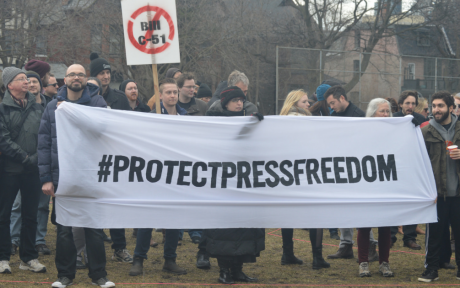News
You are here
Journalistic Sources Protection Act passes in Parliament

October 27, 2017
Canada’s media has for years been littered with examples of neglect or willful misconduct on the part of the state. The prosecution of The Independent journalist Justin Brake for his coverage of Muskrat Falls’ hydro project, the RCMP’s aggressive campaign to force VICE journalist Ben Makuch to hand over encrypted communications between himself and a source, and the surveillance of six journalists’ phone records by Quebec provincial police are just a few examples of Trudeau-era abuse against the press. As on almost all issues, from imperialism to pipelines, the Trudeau government continues to speak in the language of progress while advancing the agenda of Harper Conservatives.
Victory for free press
This trend has recently received a significant, if imperfect rebuke in Bill S-231, the Journalistic Sources Protection Act. For decades Canada has been one of the few developed nations without a press shield law. On October 4 Parliament unanimously passed Bill S-231. S-231 had originated in the Senate in November of 2016. The bill was up for a vote before the summer, ultimately delayed until fall. Sustained pressure from grassroots civil society groups as well as high support among Canadians led to this result.
The campaign to have S-231 passed was largely led by Canadian Journalists for Free Expression. When reached for comment, Duncan Pike, current co-director of CJFE and campaign lead for S-231 told Socialist.ca:
“The confidential relationship between journalist and source is crucial to the ability of the press to keep those in power accountable. Without anonymous sources, stories like the sponsorship scandal or graft in the Quebec construction industry could not have been revealed to the public. The sources who bring information of corruption, wrongdoing, and fraud to journalists play an essential role in keeping the public informed and our democracy accountable. With Bill S-231 now the law of the land, these anonymous heroes will have greater assurance that their identity will not become public through a police wiretap or court order, and they will be safe from reprisal. This means that more sources will come forward, important stories will continue to be told, and Canadian democracy will be strengthened.”
Under the new law, journalists will be able to deny disclosing information that could put vulnerable, confidential sources at risk. Law enforcement must now prove to a superior court judge that evidence (a journalist’s documents, communications, etc.) is needed, which would prevent scandals like the spying on reporters by Quebec police. It has become more difficult for journalists to be strong-armed into acting as evidence collectors for the state.
Limitations
While the bill is a welcome development in a capitalist democracy that purports to value the role of a free press, there is still much to accomplish. For starters, S-231 is not sufficiently robust in its definition of who is a journalist. This inevitably skews protection towards old-guard media, more likely to have their employees regarded as “journalists” by the courts. Additionally, the bill passing into law will have no effect on the state’s case against VICE’s Makuch, who is currently trying to take his case to the Supreme Court of Canada. S-231 only offers protection to sources who request anonymity - Makuch’s source did not.
The Canadian state’s climate of hostility towards the press has made for shameful headlines. Reporters Without Borders’ 2017 World Press Freedom Index highlighted this. Canada fell 14 spots over the course of the last two years, which included Trudeau’s first year in power. Additionally, one of the Liberals’ worst campaign promises remains one of the only ones unbroken: Harper’s 2015 Anti-Terrorism law (Bill C-51) remains largely intact, if reformed, as the Trudeau Liberals’ C-59. Among Bill C-59’s carryover is the ability for law enforcement to impersonate journalists and spread false reports i.e. fake news. With extremists on the right in positions of power across the world seeking to delegitimize the press entirely, it is crucial for people to rally against these police powers.
The International Socialists are committed to publishing progressive stories through the Socialist Worker newspaper, and online at Socialist.ca. You can contribute to our efforts by joining our organization or donating here.
Section:
Topics:









